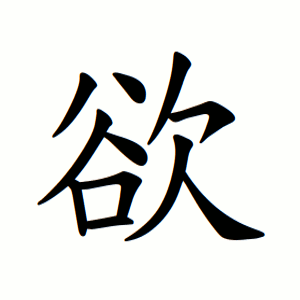欲
- to desire, to want, to wish;
Etymology
Phono-semantic compound:
谷 (valley, gorge; phonetic, yù);
欠 (yawning, to lack; semantic, connected with breath, need, desire).
Originally denoted “to crave, to long for,” linked with the sense of an inner lack (欠). Over time, it broadened into the general meanings of “wanting” or “intending.”
Semantic range:
- to desire, to long for, to crave;
- to intend, to be about to (future action marker in Classical Chinese);
- figurative: yearning, aspiration, pursuit;
- in Buddhist/Confucian texts: worldly desire (contrasted with detachment).
Usage in Korean
欲望 (욕망) – desire, craving
食欲 (식욕) – appetite
情欲 (정욕) – lust, carnal desire
欲求 (욕구) – want, demand
貪欲 (탐욕) – greed, avarice
Additional notes
Closely related to 慾 (욕심 욕), which emphasizes greed, covetousness, or selfish desire. 欲 is broader, often neutral (“to want, to wish”).
In modern simplified Chinese, 欲 is often used in place of 慾.
In Classical Chinese, 欲 can function as an auxiliary verb meaning “about to, on the point of.” Example: 欲行 (“about to go”).
In Buddhist texts, 欲 often refers to desire as one of the fundamental causes of suffering, part of the “three poisons” (greed, hatred, delusion).
Words that derived from 欲
- 金口弓人 (CRNO)
- ⿰ 谷 欠
